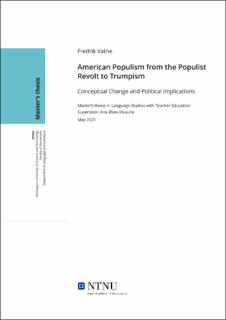| dc.contributor.advisor | Vikaune, Ane Øien | |
| dc.contributor.author | Vatne, Fredrik | |
| dc.date.accessioned | 2022-02-18T18:20:38Z | |
| dc.date.available | 2022-02-18T18:20:38Z | |
| dc.date.issued | 2021 | |
| dc.identifier | no.ntnu:inspera:80303918:11985289 | |
| dc.identifier.uri | https://hdl.handle.net/11250/2980156 | |
| dc.description.abstract | Denne masteroppgaven er en konseptuell analyse av Amerikansk populisme, som tar sikte på å analysere hvordan populisme har skiftet betydning og hatt ulike roller gjennom amerikansk historie. Oppgaven sammenligner tre viktige populistiske bevegelser i amerikansk historie: Det ‘populistiske opprøret’ på tampen av det 19. århundre; den ‘konservative høyrebevegelsen’ fra det 20. århundre; og den ‘moderne høyrebevegelsen’ fra det 21. århundre. Jeg avvender konseptuell historie som metode med sikte på å analysere hvordan betydningen og rollen til populisme har blitt formet av ulike ‘konseptuelle slektninger’ (slik som kapitalisme, liberalisme, og nyliberalisme) i løpet av amerikansk historie. Gjennom grundig analyse av de sosiopolitiske kontekstene til disse tre bevegelsene, viser denne oppgaven hvordan populisme har utviklet seg fra å være et grasrot-fenomen i det 19. århundre til å bli et politisk fenomen som har dominert amerikansk politikk i det 21. århundre. Analysen viser også hvordan populisme har dreid seg om skjev politisk representasjon; hvordan populisme har hatt positiv og negativ innvirkning på det amerikanske demokratiet; og hvordan populisme har bidratt til å endre retningen på amerikansk politikk historisk. | |
| dc.description.abstract | This thesis is a conceptual analysis of American populism, which aims to examine how the meaning and role of populism has changed throughout American history. This thesis compares and contrasts three crucial populist movements in American history: The Populist Revolt of the late 19th century; the Conservative Right of the 20th century; and the Modern Right of the 21st century. I rely on the methodology of conceptual history in order to examine how certain conceptual relatives of populism, such as capitalism, liberalism and neoliberalism, have shaped the meaning and role of American populism throughout the centuries. Through in-depth analysis of the sociopolitical contexts of these three periods, this thesis demonstrates how 19th century grassroots populism has developed into a political force which has dominated national politics in the 21st century. The analysis also demonstrates how populism has embodied issues with political representation; how populism has had positive and negative effects on American democracy; and how populism has served to change the direction of American politics historically. | |
| dc.language | eng | |
| dc.publisher | NTNU | |
| dc.title | American Populism from the Populist Revolt to Trumpism - Conceptual Change and Political Implications | |
| dc.type | Master thesis | |
